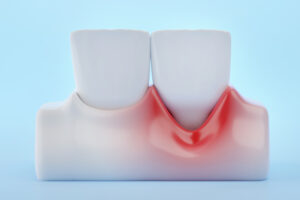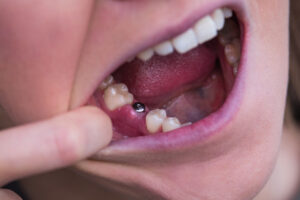We understand dental anxieties. Let’s talk about gum health
Periodontics is a branch of dentistry dedicated to the health of your gums, the unsung heroes that support and anchor your teeth. Periodontists are like the architects of your smile. They focus on the intricate network of tissues, gums, bone, and ligaments that surround and hold your teeth in place. Healthy gums are essential for a healthy mouth, they provide the base for a functional and beautiful smile.
When gums become inflamed or infected (gum disease), it can lead to serious problems, including tooth loss and even impact your overall health. Our periodontists are experts in preventing, diagnosing, and treating gum disease, ensuring your smile stays strong and healthy for years to come.
Common concerns

Gum Disease
Gum disease, also known as periodontal disease, is an inflammation of the gums caused by a buildup of plaque, a sticky film teeming with bacteria. If left untreated, gum disease can progress through stages, eventually leading to tooth loss.
The good news? Gum disease is highly treatable, especially in its early stages. Here’s a breakdown of the stages and common symptoms:
Stage 1: Gingivitis
This is the earliest and most treatable stage. Gingivitis often shows no discomfort, but you might notice:
- Bleeding gums: This is a common sign, especially when brushing or flossing.
- Redness and swelling: Healthy gums are pink and firm, while gingivitis can cause the gums to appear red, puffy, and inflamed.
Stage 2: Periodontitis
If gingivitis goes untreated, it can advance to periodontitis. Symptoms may worsen and include:
- Persistent bad breath: This is caused by the buildup of bacteria.
- Receding gums: The gums pull away from the teeth, creating pockets that can trap food and bacteria.
- Loose teeth: As the bone and tissue supporting your teeth are damaged, your teeth may become loose.
Don’t wait! Gum disease is treatable!
Early intervention is key to preventing serious complications. We offer a variety of effective treatments to combat gum disease and restore your oral health. Visit our treatment page to learn more and schedule an appointment today.

Receding gums
Ever noticed your teeth seem a bit longer than before? That could be a sign of receding gums. Receding gums happen when the gum tissue around your teeth wears away, exposing more of the tooth root. This can not only affect the aesthetics of your smile but also pose a threat to your oral health.
What causes receding gums?
Several factors can contribute to receding gums, including:
- Poor oral hygiene: Plaque buildup, the sticky film of bacteria that forms on teeth, can irritate and inflame gums, eventually leading to recession if left unchecked.
- Aggressive brushing: Brushing too hard or using a stiff-bristled toothbrush can damage gum tissue over time.
- Gum disease: Gingivitis and periodontitis, the advanced stage of gum disease, can cause inflammation and destruction of gum tissue and bone, leading to recession.
- Hormonal changes: Pregnancy and menopause can make gums more sensitive and prone to inflammation.
- Tobacco use: Smoking and chewing tobacco weaken the immune system’s ability to fight off gum infections, accelerating gum recession.
Early intervention is key
The good news is that receding gums can often be stopped in their tracks with early intervention. Here’s why it’s crucial to address receding gums as soon as possible:
- Prevents further bone loss: Healthy gums provide a strong foundation for your teeth. As gums recede, the underlying bone can also be lost, weakening the support for your teeth and increasing the risk of tooth loss.
- Reduces sensitivity: Exposed tooth root surfaces are more sensitive to hot, cold, and sweet foods and drinks. Early intervention can help prevent this discomfort.
- Improves overall oral health: Untreated gum disease can have a negative impact on your overall health. Early diagnosis and treatment of receding gums can help maintain good oral health.

Gummy smile
A gummy smile, sometimes called an excessive gingival display, occurs when a significant amount of gum tissue shows when you smile. While a healthy smile naturally reveals some gum tissue, a gummy smile can expose excessive amounts, sometimes even reaching the upper lip. This can be a source of aesthetic concern for many people.
Aesthetic concerns of a gummy smile
A gummy smile can make teeth appear shorter than they are and can sometimes create the appearance of a long face. People with gummy smiles may feel self-conscious about smiling broadly or laughing freely.
Treatment options for a gummy smile
The good news is that there are effective treatment options available to address a gummy smile and create a more balanced and aesthetically pleasing appearance.
- Gum contouring: This traditional surgical technique reshapes the gumline with specialised instruments.
Finding the right treatment
The best treatment option for your gummy smile will depend on the severity of the condition and your desired outcome. We recommend scheduling a consultation with us to discuss your concerns and explore the most suitable treatment approach for you.
Bleeding gums
Bleeding gums, while not always a cause for immediate alarm, shouldn’t be ignored. It’s your body’s way of signalling that something’s amiss with your gum health. Here are some potential causes of bleeding gums:
- Brushing too hard: Overenthusiastic brushing with a stiff-bristled toothbrush can irritate and damage delicate gum tissue, leading to bleeding.
- Gingivitis: This is the early stage of gum disease, caused by plaque buildup at the gumline. Gingivitis is highly treatable, but if left unchecked, it can progress to periodontitis, a more serious condition that can lead to tooth loss. Bleeding gums are a common symptom of gingivitis.
While occasional minor bleeding after brushing might not be a major concern, persistent bleeding or bleeding accompanied by other symptoms like redness, swelling, or receding gums warrants a visit to us to check it out. We can diagnose the underlying cause of your bleeding gums and recommend the most appropriate treatment course.
Early diagnosis and intervention are key to preventing gum disease from progressing and safeguarding your oral health. Schedule an appointment with us today for a comprehensive evaluation and keep your smile healthy and happy!

Failing tooth implant
Dental implants are a remarkable innovation, offering a strong and natural-looking solution for replacing missing teeth. While highly successful, there are a few reasons why an implant might fail.
- Infection: Bacteria in the mouth can sometimes lead to infection around the implant site, which can loosen the implant and ultimately cause failure.
- Overloading: Just like any structure, implants can be overloaded by excessive pressure from chewing. This can happen if the implant is placed in an area that bears a lot of force or if there are issues with the surrounding bone.
The vast majority of dental implants are highly successful, with success rates exceeding 95% in some studies. If you’re concerned about a potential implant issue, don’t hesitate to contact us.
Early detection and intervention are key to addressing failing implants. Our experienced dentists can assess the situation, determine the cause of the problem, and recommend the most appropriate course of action. In many cases, a failing implant can be salvaged, saving you time, money, and the need for additional procedures.
Degrading jawbone
The jawbone, often called the alveolar bone, plays a crucial role in your oral health. It acts as the foundation for your teeth, literally anchoring them in place. Healthy jawbone tissue provides the support needed for you to bite, chew, and speak comfortably.
What causes jawbone loss?
Unfortunately, several factors can contribute to jawbone loss, weakening this essential structure:
- Gum disease: Untreated gum disease, also known as periodontitis, is a major culprit. The inflammation and infection associated with gum disease can damage the bone that supports your teeth, leading to bone loss over time.
- Missing teeth: When a tooth is missing, the jawbone doesn’t receive the stimulation it needs to stay strong. This can trigger bone resorption, where the body breaks down unused bone tissue.
Early intervention is key!
Jawbone loss is a progressive issue, but the good news is that early intervention can make a significant difference. By addressing the underlying causes, such as gum disease or missing teeth, we can help prevent further bone loss and safeguard your oral health.
- Preserves your teeth: A strong jawbone is essential for keeping your teeth firmly in place. Bone loss can increase the risk of tooth loss.
- Maintains facial structure: The jawbone plays a role in supporting facial features. Bone loss can lead to a sunken appearance in the jawline and cheeks.
- Improves overall health: Studies have shown a link between poor oral health and chronic health conditions like diabetes and heart disease. Maintaining a healthy jawbone contributes to overall well-being.

What to expect at your periodontal appointment
Concerned about your gum health? A periodontal appointment with us can address those worries and get you on the path to a healthier smile. But what exactly happens during one? Here’s a brief breakdown of our consultation process at Goossens & Odendaal.
Consultation
We’ll start by discussing your overall health, any medications you’re taking, and any past dental procedures. This helps us understand your unique situation and potential risk factors for gum disease.
Comprehensive Examination
Our periodontist will then conduct a thorough examination of your mouth. This includes checking your gums for signs of inflammation, recession, or bleeding. We’ll also measure the depth of the pockets between your teeth and gums, as healthy gums have a depth of 3mm or less. X-rays may be necessary to assess the health of your jawbone.
Discussing treatment options
Based on the examination findings, we’ll discuss the most suitable treatment options for you. This may include non-surgical procedures like scaling and root planing (deep cleaning), or in some cases, surgical interventions. We’ll explain each option in detail and answer any questions you may have.
Taking control of your oral health
Ready to address your gum health concerns and achieve a confident smile? Don’t hesitate to schedule an appointment! Our goal is to empower you with the knowledge and personalised treatment plan necessary to achieve optimal oral health.
Additional resources
For further information on periodontics and gum health, you can explore these reputable resources:
- British Society of Periodontology: https://www.bsperio.org.uk/
- Mayo Clinic: https://www.mayoclinic.org/diseases-conditions/periodontitis/symptoms-causes/syc-20354473
- National Institute of Dental and Craniofacial Research: https://www.nidcr.nih.gov/
By taking charge of your gum health, you’re investing in a healthier and brighter smile for years to come. Let’s work together to achieve your oral health goals!
Frequently Asked Questions
The majority of the population in the UK suffer from some form of gum disease, which is a significant cause of tooth loss. Gingivitis and periodontitis are the two main forms of this disease. You can check for early signs of gum disease when you are brushing your teeth. If there is blood on your toothbrush or in the water when you are rinsing your mouth, this may indicate that you have a gum problem. Also, your gums may bleed when eating and your breath may become unpleasant. You should consult your dentist or hygienist to discuss ways of improving your gum health.
Plaque and hard deposits of tartar are the main causes of gum disease. The most common reason for gum disease is that people do not clean their teeth and gums as often or as thoroughly as they should. So it is essential that you maintain a good dental care routine to remove all of the plaque from your teeth. However, there are factors that will mean that some people are more likely to get gum disease, such as:
- Smoking and drinking excess amounts of alcohol, which are also linked with mouth cancer
- Drugs and medicine and hormonal changes can affect your gums
- Some diseases, such as diabetes can weaken gums and bones and therefore, increase the risk of disease
Gingivitis is a term used to describe the inflammation of gums. It is the first stage of gum disease, where the gums become red and swollen and may bleed when brushing your teeth.
Periodontitis is a deeper form of gum disease that affects the bone supporting the teeth. Left untreated, periodontitis may eventually result in teeth having to be extracted, as some of the bone is lost and teeth become loose. You can prevent periodontal disease from getting worse by maintaining a good dental care routine and making regular visits to your dentist or hygienist.
You should visit your dentist for an examination, so that they can check your teeth and gums and prescribe what treatment is required.
Dentists also recommend using a small-headed toothbrush with ’rounded’ bristles, so that it doesn’t cause any damage to your gums. Brushing alone will not remove all the plaque from in between your teeth. Using dental floss is extremely useful here. Your dentist or hygienist is best placed to advise you on which cleaning methods are best for you.
Yes, gum diseases can be treated and managed, but complete cure depends on the severity of the condition and individual oral health practices. Early stages of gum disease, such as gingivitis, can often be reversed with proper oral hygiene, including regular brushing, flossing, and professional dental cleanings. However, more advanced stages like periodontitis may require more intensive treatments, such as scaling and root planing, antibiotics, or in severe cases, surgical intervention. It’s crucial to address gum disease promptly, as untreated cases can lead to complications. Regular dental check-ups and maintaining good oral hygiene are essential for preventing and managing gum diseases.
The most effective way to treat gum disease involves a combination of professional dental interventions and consistent at-home oral care. Dental cleanings, such as scaling and root planing, are commonly used to remove plaque and tartar buildup below the gumline. Antibiotics may be prescribed to control bacterial infection. Additionally, maintaining a rigorous oral hygiene routine, including regular brushing, flossing, and using an antiseptic mouthwash, is crucial for managing gum disease. It’s important to seek advice from a dental professional who can tailor the treatment plan to the individual’s specific condition and provide guidance on optimal oral health practices. Regular dental check-ups also play a key role in monitoring and managing gum disease effectively.



